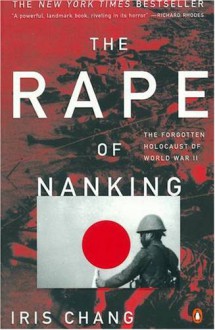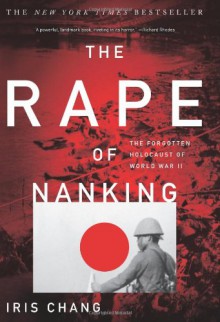
Beginning in 1937 and continuing until 1945, Japan controlled the capital city of Nationalist China, Nanking. They had already conquered Shanghai. This military effort was part of their ongoing design to conquer Asia. Their barbarism has largely remained unknown because of political efforts to silence the truth. Shining a light on the brutality of the Japanese during that era is essential if our intent is to prevent such a "Holocaust" from occurring again. As Chang quotes Santayana, those who do not learn from history are doomed to repeat it. Today, we are witnesses to carnage in Somalia, and we have witnessed it in Rwanda and Bosnia, Syria and Korea, to name just a few trouble spots that the world has largely ignored, and stood by and watched, as these people murder each other.
The "collective amnesia" the author, Iris Chang, refers to could be a description of what is happening in our own country today, with the dissemination of only selective information, and of suspected "cover-ups" that keep unfolding (the riots in Benghazi, the IRS targeting individuals and groups, and intrusions into our private phone calls and emails by the government), which restricts transparency and limits the access of the public to information they need in order to fairly assess what is happening in the world around them and in order to prevent the power of the government and the control of the people, from getting out of hand. Nothing should prevent the truth from coming out, not politics, not corruption, not laws designed to hide information or the arrogance of leaders. Those that blow the whistle and inform are sometimes heroes, not traitors, because without the light they shine on subjects being veiled, little about the truth of certain policies and events would ever be exposed, and the picture painted for the public to see, would be of a world that truly does not exist.
This brave author has gone where others have not, where others who have tried have failed, been punished and even died in their efforts to expose or ask questions leading to the truth. She introduces the reader, clearly and succinctly, to the history of Japan's culture which created and is responsible for the brutal behavior of its people, the Samurai and Kamakazi attitude about honor and death, the adoration of an emperor with power and worth that supersedes that of G-d, the subservience of their own life to his which led to their belief that life is less valuable when it is sacrificed to the cause of the emperor and his government. To most of the Japanese, historically and during the wartime era, the subsuming of the individual to the common good, the dedication of the individual to the militaristic view of life and their belief in the superiority of themselves and of their country, including its right to march on and control Asia, with the West and the “whites” being the enemy, definitely effected their unrealistic world view, which was a warped and corrupt world view, that they almost succeeded in accomplishing, by surprising their victims with their aggression and barbarism, behavior unexpected from a culture that, on the face of things, worshiped respect and courtesy.
The brutality and barbarism of the Japanese soldiers defies belief and equals if not surpasses, the evil of the Nazis, according to Iris Chang, based on information she garnered after extensive and extraordinary research into the events of the Rape of Nanking. She tries to explain what makes people into such beasts, however, for me, it is unexplainable. How can such indifference to human suffering be borne by normal men and women? How could financial concerns and politics prevent action against such barbaric behavior? How could politics prevent the subject from ever being explored, how could it prevent Japan's admission of guilt and foster its consistent denial of the brutal treatment to hundreds of thousands of victims? How can the history of such sadistic, demonic behavior be hidden by anyone in power? Why isn’t the history of this event taught in schools? How could we get advanced degrees and never have learned about this monstrous episode? Why is such scandalous conduct ignored by the world and how can it go largely unpunished, even to this day? Why were no reparations paid? What could possibly possess any human being to be so depraved in their conduct to another?
A Safety Zone was set up in Nanking by some two dozen or so foreigners, in an attempt to save the victims of the Japanese barbarism. They were subject to brutality, as well, and many were accused of collaboration after the war ended, proving that no good deed goes unpunished. Three such people were John Rabe, Robert Wilson and Wilhelmina Vaquin.
Wilson was a surgeon in Nanking University Hospital who worked tirelessly to protect shelter and save the victims of the Japanese brutality. He suffered from seizures and nightmares throughout his life.
Rabe was the head of the International Committee in Nanking and head of the Safety Zone which he was very instrumental in creating. Chang refers to John Rabe, leader of the Nazi party in Nanking, as the “Oskar Schindler” of China. He was an unlikely hero. Contrary to the reprehensible behavior of the Nazi's during WWII, he was a source of help in China, imploring the German government to intercede and to halt the rampages of the soldiers, murdering, raping, stealing and destroying innocent people as they conquered Nanking. Inadvertently, I wondered, could his letters home have helped create the playbook for Hitler’s monstrous effort to achieve Aryan superiority and racial purity? It seemed to me, as I read, that the behavior of the Japanese government and military, foreshadowed events to come under the reign of Hitler in Germany.
According to his own remarks and writings, Rabe believed in the National Socialists, in so far as their concern for the cause of the worker, but not in so far as their hatred of other races, or their monstrous activities of torture and annihilation. Surely his documented exemplary behavior during the Rape of Nanking, goes a long way to prove that point.
Wilhelmina (Minnie) Vautrin was the acting head of Ginlin Women’s College. A missionary, she tried to prevent the rape, torture and arrest of the people who sought refuge on her campus. Her efforts and memories of the events so debilitated her, that she eventually suffered a nervous breakdown, and soon after she took her own life.
Sadly, the author also committed suicide. In her thirties, she was diagnosed with bi-polar disease and was plagued with thoughts about persecution. However, she was well when she penned the book and her exhaustive research and excellent writing style and skill portray the times with an honesty and openness that shine a light on the history with thoughts about why it happened and thoughts about how to prevent it from happening again, namely from holding the guilty parties responsible and never forgetting these “Holocaust” events and in so doing, learning from the history to make sure it never happens again. Her great sorrow was that, in Japan, reprisals are still made against those who speak honestly about The Rape of Nanking, and then they deny it or suppress existing information concerning the horrific event. It has become the best kept secret of the era and should become the most talked about if we are to learn from history and not repeat the same mistakes.
Reading the book is grueling, so horrific are the details for any human to digest. I will not relate them here, but I hope that many will be inspired to read this book and learn about them after they read my review. Some important questions to ask oneself after reading the book are: Why did Germany suffer repercussions and Japan largely escape major scrutiny and punishment? Why is the world still largely in the dark about this event? If we are not informed, will our ignorance and ostrich-like behavior eventually betray us again?
 By far the most painful book I have ever read and yet a book that should be READ, passed on, READ, passed on, READ and passed on and ON so that new generations of people learn what those forever silent can't relate to their loved ones because they themselves have been Massacred
By far the most painful book I have ever read and yet a book that should be READ, passed on, READ, passed on, READ and passed on and ON so that new generations of people learn what those forever silent can't relate to their loved ones because they themselves have been Massacred
 Log in with Facebook
Log in with Facebook 






